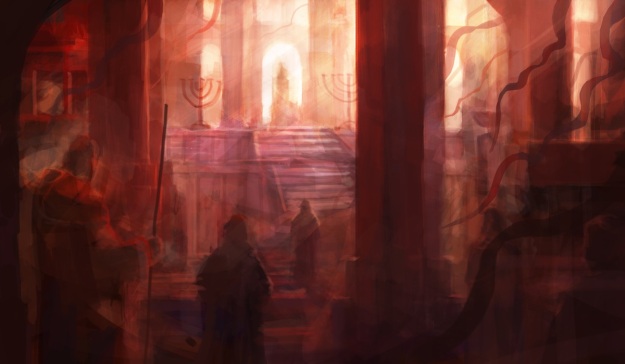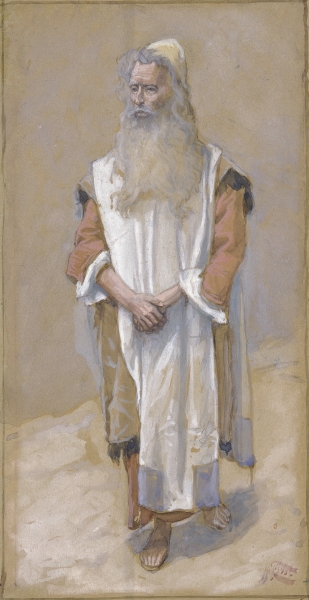
Isaak Asknaziy, Vanita vanitatum et omnia vanitas (19th Century)
1 Kings 9: 1-9 Solomon’s Second Vision of the LORD
1 When Solomon had finished building the house of the LORD and the king’s house and all that Solomon desired to build, 2 the LORD appeared to Solomon a second time, as he had appeared to him at Gibeon. 3 The LORD said to him, “I have heard your prayer and your plea, which you made before me; I have consecrated this house that you have built, and put my name there forever; my eyes and my heart will be there for all time. 4 As for you, if you will walk before me, as David your father walked, with integrity of heart and uprightness, doing according to all that I have commanded you, and keeping my statutes and my ordinances, 5 then I will establish your royal throne over Israel forever, as I promised your father David, saying, ‘There shall not fail you a successor on the throne of Israel.’
6 “If you turn aside from following me, you or your children, and do not keep my commandments and my statutes that I have set before you, but go and serve other gods and worship them, 7 then I will cut Israel off from the land that I have given them; and the house that I have consecrated for my name I will cast out of my sight; and Israel will become a proverb and a taunt among all peoples. 8 This house will become a heap of ruins; everyone passing by it will be astonished, and will hiss; and they will say, ‘Why has the LORD done such a thing to this land and to this house?’ 9 Then they will say, ‘Because they have forsaken the LORD their God, who brought their ancestors out of the land of Egypt, and embraced other gods, worshiping them and serving them; therefore the LORD has brought this disaster upon them.'”
This second appearance of the LORD to Solomon echoes the covenantal themes that have recurred throughout the initial eight chapters of 1 Kings. Although the consequences for turning aside from keeping the commandments and statutes of the LORD is spoken in more ominous tones directly from the mouth of God, we’ve seen the necessity of obedience in David’s words to Solomon (2:2-4), in the LORD’s first appearance to Solomon (3:14), the word of the LORD during the construction of the temple (6: 11-13), and from Solomon’s own mouth in the extended prayer of dedication (8:22-53). The dedication of the temple and the sacrifices offered there are not enough, nor are they primary to the LORD. The timing of this divine visitation and its charge and warnings should alert us to the danger that Solomon faces as his material prosperity continues. Knowing the failures of the end of Solomon’s reign this warning at the apex of his success may help the attentive reader begin to see that Solomon, “did not fail overnight; darker strands and shadows are revealed, indicating the deep flaws that threatened the impressive national enterprise.” (Israel, 2013, p. 113)
The LORD’s response to Solomon indicates that God is listening to the prayers offered at the temple and that God continues to fix God’s vision and God’s will upon this place where the people can come to offer their petitions and their sacrifices. Yet, it is not Solomon who has consecrated the temple but the LORD. The covenant is once again restated and Solomon who earlier asked for wisdom is again offered the path of wisdom. In stark language the cost of disobedience is spelled out and the presence of the temple is not a guarantee of God’s protection if the people and their king do not practice obedience. The city, the temple and the nation of Israel are all contingent on the provision of the LORD and if they turn away they will be an example that others will ‘hiss’ at to avoid sharing their curse as they pass by.[1] Solomon is asked to navigate the uneasy tension between his consolidation of power and wealth in his ‘royal growth economy’ (Brueggemann, 2000, p. 128) and the principles of the Law of God.
1 Kings 9: 10-14 Entanglement with the Ways of Tyre and Egypt
0 At the end of twenty years, in which Solomon had built the two houses, the house of the LORD and the king’s house, 11 King Hiram of Tyre having supplied Solomon with cedar and cypress timber and gold, as much as he desired, King Solomon gave to Hiram twenty cities in the land of Galilee. 12 But when Hiram came from Tyre to see the cities that Solomon had given him, they did not please him. 13 Therefore he said, “What kind of cities are these that you have given me, my brother?” So they are called the land of Cabul to this day. 14 But Hiram had sent to the king one hundred twenty talents of gold.
15 This is the account of the forced labor that King Solomon conscripted to build the house of the LORD and his own house, the Millo and the wall of Jerusalem, Hazor, Megiddo, Gezer 16 (Pharaoh king of Egypt had gone up and captured Gezer and burned it down, had killed the Canaanites who lived in the city, and had given it as dowry to his daughter, Solomon’s wife; 17 so Solomon rebuilt Gezer), Lower Beth-horon, 18 Baalath, Tamar in the wilderness, within the land, 19 as well as all of Solomon’s storage cities, the cities for his chariots, the cities for his cavalry, and whatever Solomon desired to build, in Jerusalem, in Lebanon, and in all the land of his dominion. 20 All the people who were left of the Amorites, the Hittites, the Perizzites, the Hivites, and the Jebusites, who were not of the people of Israel — 21 their descendants who were still left in the land, whom the Israelites were unable to destroy completely — these Solomon conscripted for slave labor, and so they are to this day. 22 But of the Israelites Solomon made no slaves; they were the soldiers, they were his officials, his commanders, his captains, and the commanders of his chariotry and cavalry.
23 These were the chief officers who were over Solomon’s work: five hundred fifty, who had charge of the people who carried on the work.
24 But Pharaoh’s daughter went up from the city of David to her own house that Solomon had built for her; then he built the Millo.
25 Three times a year Solomon used to offer up burnt offerings and sacrifices of well-being on the altar that he built for the LORD, offering incense before the LORD. So he completed the house.
26 King Solomon built a fleet of ships at Ezion-geber, which is near Eloth on the shore of the Red Sea,1 in the land of Edom. 27 Hiram sent his servants with the fleet, sailors who were familiar with the sea, together with the servants of Solomon. 28 They went to Ophir, and imported from there four hundred twenty talents of gold, which they delivered to King Solomon.
Many readers of 1 Kings will see chapters nine and ten as a testament to Solomon’s wise management of the kingdom of Israel, but on closer inspection it is clear that something is amiss in the administration of Solomon. Solomon has become entangled in the ways of King Hiram of Tyre and the Pharaoh of Egypt. In this and the following chapter the word gold is written seventeen times and this gold standard illustrates Solomon’s focus on indulgence and extravagance. (Israel, 2013, p. 116) The arrangement with King Hiram was dependent on the continued agricultural prosperity of the land of Israel, but now Solomon has either fallen in arears in his payments to Hiram or is so desperate for gold that he hands over twelve towns in the northern part of the kingdom. The area which the displeased King of Tyre labels ‘Cabul’ is an agriculturally prosperous region, and we have no indication of why Hiram is unhappy with the transaction. It is possible that Hiram is continuing to attempt to manipulate the deal in his favor or that the recording of this being unpleasing land softens the domestic blow for Solomon. Regardless, the ceding of a portion of the land to another nation in exchange for gold (and perhaps debt relief) indicates that the land and the people are less important to Solomon than gold.
We return to the use of forced labor again, and now (in contrast to 5:27-30) the text indicates that it is only other conquered people who are used in forced labor. Yet, the scale of these projects would probably be impossible without the employment of the people of Israel in all these projects. Even if it is only the Canaanites who are now placed in forced labor, this casts Solomon in a similar light as Pharaoh. In addition to the temple and Solomon’s houses there are several other major projects listed: the Millo (likely a terrace system on the eastern side of Jerusalem), walled cities (the primary defensive structure of the time), cities for storage, and for his military garrisons. The last two again parallel Solomon and Pharaoh. The word for ‘storage cities’ (arei miskenot)[2] recalls Israel’s enslavement in Egypt, but now Solomon is the king. (Israel, 2013, p. 117) Solomon’s adoption of an army built around chariots and cavalry also is adopting the primary weapons utilized by Egypt, and this is the item a king of Israel is not to go to Egypt to acquire (Deuteronomy 17: 16). In addition we are reminded of this connection by the mention of Pharaoh’s daughter who Solomon has already constructed a house for.
Finally Solomon continues his alliance with Tyre and learning the ways of this seafaring and trading nation. It is interesting that Solomon constructs his fleet in Ezion Geber in Edom which gives him access to the Gulf of Aqaba and the Red Sea to the south instead of the Great Sea ‘what we call the Mediterranean) in the west. Solomon may no longer be in control of the Philistine territories that his father David subdued, or it may be in Tyre’s best interest to have access to the southern passage which leads to Ethiopia (Cush) and Eastern Africa. Once again the adoption of the ways of Tyre brings Solomon additional wealth from Ophir, but Solomon’s use of wisdom for the acquisition of larger quantities of gold and other objects of luxury, his emulation of the ways of Pharaoh and King Hiram, and his continual employment of forced labor placed alongside his continued piety at the temple suggest the deep flaws in this national enterprise. Solomon seems to have gained the world but to have sold his soul of the nation for gold.
[1] This is a phrase used in Jeremiah 18:16 and 19:8 as Jeremiah attempts to warn the people of God’s coming judgment. (Cogan, 2001, p. 296)
[2] Only used here and in Exodus 1:11 (Cogan, 2001, p. 303)










